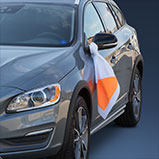
(BEDFORD) – Distress Bandanna™ and State Farm® are teaming up to remind drivers of Scott’s Law and other driving tips to stay safe during summer travels.
Scott’s Law, or the “Move Over” law, requires drivers to slow down and move over one lane when possible when approaching stopped emergency vehicles, stranded motorists with hazard lights on, and any vehicle with flashing lights, says Judy Macy, of State Farm.

Distress Bandanna, a non-profit organization originated in Southern Illinois, promotes safe teen driving through educational outreach and classroom presentations. By pairing up with local police officers and State Farm agents, Distress Bandanna has distributed more than 58,000 bandannas to teen drivers to be used in roadside emergency situations.
This past year, Distress Bandanna offered an extra credit assignment to students going through this program. After each presentation, the organization posts class photos on social media, and students are asked to share or retweet with “#ScottsLaw”, “#MoveOver” or “#All50States”.
“We feel strongly in the education of new drivers and creating safe driving habits while they are young will make our roadways safer for everyone,” says program founder and coordinator Vivian Anderson.
State Farm has supported the Distress Bandanna program since 2017 and has presented to drivers’ education students in high schools across Illinois, Indiana, Florida, Michigan, Missouri, and Tennessee. For more information on Distress Bandanna, go to http://distressbandanna.com/index.html.

As the weather heats up and more drivers take to the roadways, Judy Macy from State Farm shared some tips to keep everyone safe while having some SUMMER FUN:
- Start your trip with GPS and music set; phone stowed. Keep children and pets content by bringing along a favorite toy, treat, or blanket.
- Understand the laws for passenger restraint. Both child and pet passengers require special attention. No passengers belong on a lap or in the bed of a pick-up truck.
- Make sure that the heating, ventilation and air conditioning system (HVAC) of your vehicle is in good condition before your trip begins. This will be especially important for those longer trips.
- Make it a point to pull over if a child or pet needs attention, or if you feel tired or drowsy. This way you keep your eyes on the road.
- Eating along the way may be necessary, but you should pull over for this, too. Pack snacks and drinks for everyone, including pets, for convenience.
- Remove loose objects from your vehicle, they can become projectiles in a crash, causing injury to people or pets. In the event of a crash, unsecured pets may become frightened and jump from open windows.
- Forbid paws and heads from being out the window. This applies to both 2-legged and 4-legged passengers.
- Understand construction may be underway along your route. Plan ahead and find alternate routes and pet-friendly stops, helping to get you to your destination on schedule.
- Never leave children or pets in cars alone for any period of time. Temperatures can rise 19 degrees in just 10 minutes, putting them at risk.



